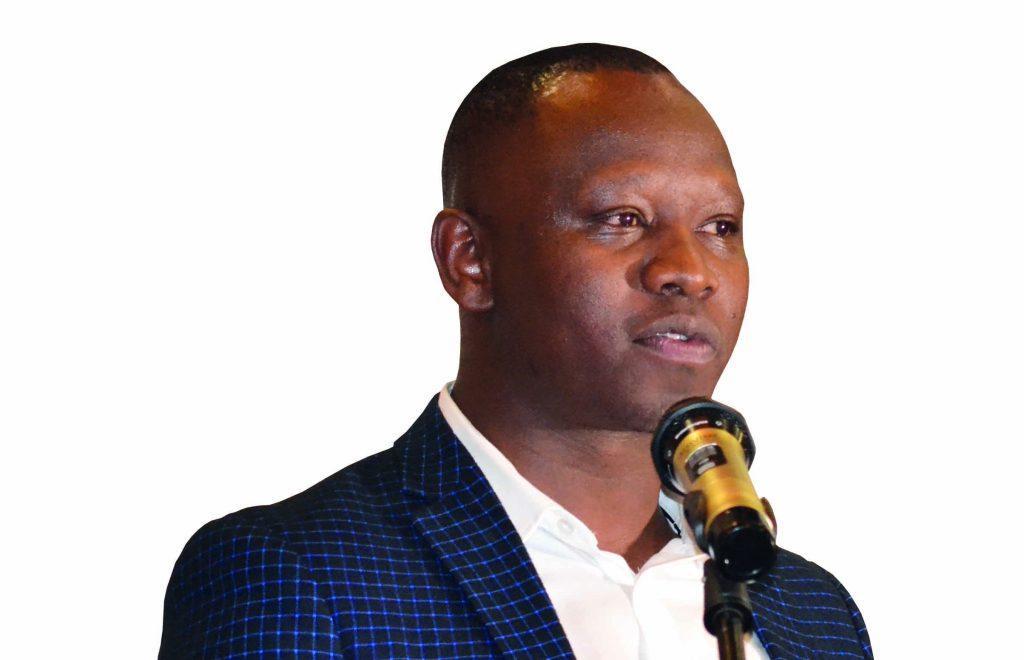Africa-Press – Lesotho. AT 40, Lejone Mpotjoane is the youngest Cabinet minister in Sam Matekane’s coalition government. He is Lesotho’s Minister of Foreign Affairs and International Relations.
That is no small feat for a man who had never held political office of note until after last October’s general elections won by his Revolution for Prosperity (RFP) party. Mpotjoane’s many admirers say he represents a new generation of leaders who are determined to make a sharp break with the country’s toxic past.
With no political contamination from the past, Mpotjoane is seen as relatively clean and a breath of fresh air in what has been a befouled political environment for decades.
The general view is that Mpotjoane brings a certain freshness in thinking on issues that have haunted Lesotho for the past five decades. These issues are related to the chronic poverty and under-development of Lesotho.
After recycling the same toxic bunch of politicians for decades, Mpotjoane says Matekane, with his strong background in business, is the right man to extricate Lesotho from the jaws of poverty.
He says he truly believes that Matekane will usher in real development for Lesotho and deal with the rampant poverty afflicting the people. Almost half of Lesotho’s 2 million people live below the poverty datum line, according to United Nations agencies, a situation Mpotjoane says must now change.
For a very long time, things were not done correctly because those without governance skills were in the driver’s seat, Mpotjoane says. The crisis for Lesotho has been that of poor leadership, he says.
That explains why our economy has been stymied, Mpotjoane says. He argues that Lesotho is paying the price for those decades of economic mismanagement.
But all is not lost; he firmly believes that his leader and mentor, Matekane, will reverse the rot and make Lesotho great again. Mpotjoane says since Matekane has a strong background in running business, he will champion the growth of the private sector.
A strong private sector will create desperately needed jobs for Basotho, he says. That, according to Mpotjoane, will save Lesotho. Mpotjoane wants to see Lesotho reaping the benefits of its massive clean water reserves.
He says there is huge potential for economic growth if the country can commercialise its water and export it. A litre of bottled water currently costs M32 while a litre of fuel costs around M17, a statistic which he says clearly shows that Lesotho can reap huge dividends if it exports bottled water.
“We have not yet added value to our water. Water could be our white gold,” Mpotjoane says.
Yet even with its massive water reserves, Lesotho still inexplicably imports bottled water from South Africa, a policy contradiction that must be urgently addressed. That should be the reverse, Mpotjoane argues.
While Lesotho exports large volumes of raw water to South Africa, Mpotjoane says he wants to see the country exporting processed bottled water to generate foreign currency and create jobs for Basotho.
He says Matekane is also currently engaged in talks with Botswana, a successful beef producer in the SADC region to set up a thriving beef industry in Lesotho.
Botswana currently exports beef to the lucrative European Union market, earning huge foreign currency in the process. He says they want Botswana to give them a share of their beef market.
Mpotjoane says all these projects are an indication that Matekane has been working his socks off behind the scenes to get things done. We have not been dragging our feet, Mpotjoane says.
Mpotjoane’s comments come amidst vicious criticism by the opposition and sections of the RFP party over the slow pace of change since the government took over in October last year.
Matekane’s critics say he has been extremely lethargic in initiating the “economic revolution” that he sold during his whirlwind election campaign last year.
Mpotjoane was at pains to defend his leader insisting that things are now beginning to move. The pace might have been slow, but there has been movement all the same, he says.
Despite the challenges, Mpotjoane says theirs is a responsive government that wants to account to the people who put it into power. That is why after its first 100 days in office it went back to the people to report on the progress they had made.
“We have to issue a report quarterly to tell the nation what we have achieved,” he says.
He says he wants to see the Ministry of Education revamping the school syllabus so that Basotho children can be taught entrepreneurship skills from a very young age.
He wants children to be taught business skills from as early as primary school. “The children should be able to handle financial issues from an early stage,” Mpotjoane says.
The idea, Mpotjoane says, is to groom a new generation of Basotho who are self-driven and can build their own businesses instead of looking for jobs in the civil service.
In fact, he would want those employed in the civil service to go on early retirement as soon as they reach the age of 40 so that they can start their own businesses. That way, the government will be able to employ fresh graduates from universities.
The RFP is currently going through turbulence after some disgruntled members accused the national executive committee of flouting the party’s constitution in picking election candidates.
They have also accused the NEC of undemocratic tendencies and heavy-handedness in dealing with genuine grievances. Mpotjoane believes the current turbulence in his party will soon be over so that they can all pull along in the same direction as a unified party.
“We have different characters but it is our fervent hope that we will achieve our mandate,” he says.
“This will soon be over. It is just a storm that will simmer down,” Mpotjoane says.
“We are happy and lucky to be led by Matekane,” he says, adding that his leader does not lead factions but a consolidated political party with a sole objective of saving the country from wretched poverty and biting unemployment.
Matekane’s leadership is consultative, Mpotjoane says. He says that is why Matekane often calls aggrieved members for talks. “It is only natural that people fight,” he says.
But even after they fight, they must still find each other through talks, he says. The crisis in the RFP saw two MPs, Dr Mahali Phamotse and Abia’s Jacob Makhalanyane, receiving death threats two weeks ago in what was seen as a new low for the party.
Mpotjoane says he was a staunch member of the All Basotho Convention (ABC) led by Nkaku Kabi. He left the party in March last year due to serious infighting.
“The tensions in the ABC pushed me out,” he says.
“That party was going through serious political turbulence.
” And when the ABC failed to resolve its differences, he walked out and joined the RFP.
What caught his interest was Matekane’s political philosophy that sought to make Lesotho self-sufficient and stop the country from importing almost everything from South Africa.
It was a message that easily resonated with his own political inclinations. “I then resigned from all my professional jobs to join the RFP,” Mpotjoane says.
Mpotjoane was working at the then Lesotho Revenue Authority (LRA) as senior manager risk and governance. When he joined the RFP, Mpotjoane was given the lofty assignment of winning all the five constituencies in Butha-Buthe.
Out of the five, the RFP won three constituencies. The Mechachane constituency was taken by the Democratic Congress (DC) by a whisker while Motete was won by Teboho Majapela’s Socialist Revolutionaries (SR).
“This was quite a plausible achievement,” Mpotjoane says. He says he worked his socks off mobilizing communities to vote for the RFP. Mpotjoane holds a Bachelor of Commerce and Accounting degree from the National University of Lesotho (NUL).
For More News And Analysis About Lesotho Follow Africa-Press






